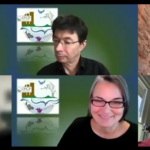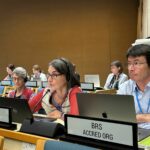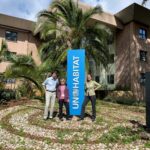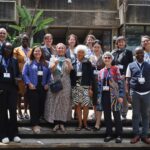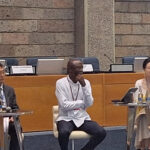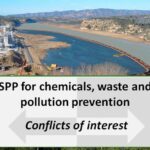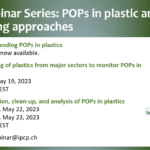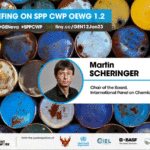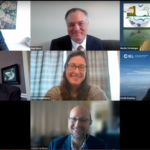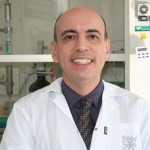The April 4th webinar is intended to provide input for the upcoming 3rd and last scheduled meeting of the Open-Ended Working Group for establishing a science-policy panel (SPP) on chemicals, waste and pollution prevention, which will take place in Geneva, June 17-21, 2024. read more
IPCP Board Member Elections (2024-2027)
The International Panel on Chemical Pollution Election Committee (IPCP-EC), composed of Robert Letcher and Anna Soehl, coordinated the IPCP board elections for a 4-year term: 2024-2027. The following board members have been reelected to serve another term: Miriam Diamond, Rainer Lohmann, and Andreas Schaeffer. Additionally four new board members have been elected: Michael Bertram, Alex Ford, Gabriel Sigmund, and Maria Clara Starling. IPCP is looking forward to working under the leadership of the current board.
IPCP Activities Update | December 2023
Here are brief summaries of some of key IPCP efforts that the board has been involved in. read more
Nairobi Briefings (OEWG-2 Official Session 5)
The second session of the ad hoc Open-Ended Working Group (OEWG-2) on the Science-Policy Panel on Chemicals, Waste and Pollution Prevention is taking place in Nairobi, Kenya, from December 11 to December 15, 2023. Three IPCP Board Members are in attendance and are providing their daily summaries. read more
Nairobi Briefings (OEWG-2 Official Session 4)
The second session of the ad hoc Open-Ended Working Group (OEWG-2) on the Science-Policy Panel on Chemicals, Waste and Pollution Prevention is taking place in Nairobi, Kenya, from December 11 to December 15, 2023. Three IPCP Board Members are in attendance and are providing their daily summaries. read more
Nairobi Briefings (OEWG-2 Official Session 3)
The second session of the ad hoc Open-Ended Working Group (OEWG-2) on the Science-Policy Panel on Chemicals, Waste and Pollution Prevention is taking place in Nairobi, Kenya, from December 11 to December 15, 2023. Three IPCP Board Members are in attendance and are providing their daily summaries. read more
Nairobi Briefings (OEWG-2 Official Session 2)
The second session of the ad hoc Open-Ended Working Group (OEWG-2) on the Science-Policy Panel on Chemicals, Waste and Pollution Prevention is taking place in Nairobi, Kenya, from December 11 to December 15, 2023. Three IPCP Board Members are in attendance and are providing their daily summaries. Photo by IISD/ENB | Anastasia Rodopoulou. read more
Nairobi Briefings (OEWG-2 Official Session 1)
The second session of the ad hoc Open-Ended Working Group (OEWG-2) on the Science-Policy Panel on Chemicals, Waste and Pollution Prevention is taking place in Nairobi, Kenya, from December 11 to December 15, 2023. Three IPCP Board Members are in attendance and are providing their daily summaries. read more
Nairobi Briefings (OEWG-2 Preparatory Meeting 2)
The second session of the ad hoc Open-Ended Working Group (OEWG-2) on the Science-Policy Panel on Chemicals, Waste and Pollution Prevention is taking place in Nairobi, Kenya, from December 11 to December 15, 2023. Three IPCP Board Members are in attendance and are providing their daily summaries. read more
Nairobi Briefings (OEWG-2 Preparatory Meeting 1)
The second session of the ad hoc Open-Ended Working Group (OEWG-2) on the Science-Policy Panel on Chemicals, Waste and Pollution Prevention is taking place in Nairobi, Kenya, from December 11 to December 15, 2023. Three IPCP Board Members are in attendance and are providing their daily summaries. Photo by IISD/ENB | Tallash Kantai. read more
Environmental Science & Technology Feature Paper: Scientists Flag Conflicts of Interest Ahead of UN Plastic and Chemical Talks
PRESS RELEASE An international group of 35 scientists is calling out conflicts of interest plaguing global plastic treaty negotiations and that have interfered with timely action on other health and environmental issues. They urge the implementation of strict guidelines to prevent the same problems from affecting the UN’s upcoming Science Policy Panel on chemicals. Their concerns and recommendations are outlined in a Feature paper in the journal Environmental Science & Technology. “From Big Tobacco to Big Oil, powerful industries use read more
Bonn Briefing (ICCM5 Meeting)
The Fifth Meeting of the International Conference on Chemicals Management (ICCM5) for the negotiations of the future of the Strategic Approach to International Chemicals Management (SAICM) took place in Bonn, Germany from 25–29 September 2023. IPCP members were in attendance and provided their recaps. read more
Call for Abstracts: SETAC Seville Session
6.14 | Science for Global Management of ChemicalsChairs: Penny Vlahos, Lena Vierke, Miriam Diamond, and Marlene Ågerstrand The United Nations has identified chemical pollution as one of the three drivers threatening humanity’s future, the other two being the loss of biodiversity and climate change. For some years, concerns about chemical pollution have resulted in actions addressing specific substances or groups of substances. On the global level, these are, for example, the Basel, Rotterdam and Stockholm Conventions. However, a comprehensive global read more
General Assembly 2023
Monday, November 27, 2023 at 14-16h Central European
The 2023 General Assembly of the IPCP will once again take place remotely. All IPCP members are welcome to attend. read more
Science Editorial: Innovate beyond PFAS
Dr. Martin Scheringer, the IPCP Chair, was recently invited to write an editorial for Science. In his article, Dr. Scheringer calls on “chemists, material scientists, product designers, and process engineers, but also downstream users of chemicals in many sectors who have to define product requirements” to innovate beyond PFAS. read more
CBS News Podcast: Forever chemicals are in Canadians’ air, water and blood
Dr. Miriam Diamond, a professor at the University of Toronto’s Department of Earth Sciences and School of the Environment and IPCP Vice Chair, talks on CBS News Front Burner podcast about why PFAS or “forever chemicals are seemingly everywhere, what can be done about them, and why it’s taken so long for the government to act”. read more
Nature Ecology & Evolution: Better integration of chemical pollution research will further our understanding of biodiversity loss
A peer-reviewed article published in the journal Nature Ecology and Evolution and co-authored by a number of IPCP members and colleagues calls for the need for a stronger interdisciplinary research focus on the impacts of chemical pollution on biodiversity loss. The authors point out the importance of obligating chemical industry to make relevant data public and developing ecological test models that cover not only individual organisms but also populations, communities, and entire ecosystems.Press release: https://idw-online.de/de/news816916Article: https://www.nature.com/articles/s41559-023-02117-6
Paris Briefings (INC-2 Meeting): Briefing Two
The second session of the Intergovernmental Negotiating Committee (INC-2) on plastic pollution took place in Paris, France, from 29 May – 2 June 2023. IPCP members were in attendance and provided their recaps. read more
Paris Briefings (INC-2 Meeting)
The second session of the Intergovernmental Negotiating Committee (INC-2) on plastic pollution took place in Paris, France, from 29 May – 2 June 2023. IPCP members were in attendance and provided their recaps. read more
IPCP Activities Update | May 2023
Here are brief summaries of some of key IPCP efforts that the board has been involved in. read more
IPCP Webinar Series: POPs in plastic and monitoring approaches
The IPCP hosted a series of webinars, for a UNEP project, on persistent organic pollutants (POPs) and POP candidates in plastics. Part I of this webinar series provided an overview on relevant POP groups (and other chemicals of concern) in plastics and some insights into related human exposure and environmental pollution including biota. Part II introduced screening and sampling strategies of plastic categories potentially containing POPs, such as plastics in electronics and vehicles or recycled pellets. Part III introduced extraction read more
Global Change Biology Opinion: Addressing chemical pollution in biodiversity research
A new paper in Global Change Biology by IPCP members and colleagues reviews the complex impacts of chemical pollution on biodiversity loss. The authors also emphasize that, to facilitate effective solutions for comprehensive environmental protection, chemical pollution, as a significant factor contributing to worldwide biodiversity loss, should be more systematically incorporated into biodiversity research. A wider collaboration among ecologists, ecotoxicologists, and environmental chemists, is urgently needed.
IPCP Bangkok Briefings (Day Five: OEWG-1.2 Meeting)
The first session of the ad hoc Open-Ended Working Group on the Science-Policy Panel (OEWG-1.2) is taking place in Bangkok, Thailand, from 30th of January to 3rd of February 2023 with a focus on the Panel’s scope and principal functions. Three IPCP Board Members are in attendance and are providing their daily recaps. read more
IPCP Bangkok Briefings (Day Four: OEWG-1.2 Meeting)
The first session of the ad hoc Open-Ended Working Group on the Science-Policy Panel (OEWG-1.2) is taking place in Bangkok, Thailand, from 30th of January to 3rd of February 2023 with a focus on the Panel’s scope and principal functions. Three IPCP Board Members are in attendance and are providing their daily recaps. read more
IPCP Bangkok Briefings (Day Three: OEWG-1.2 Meeting)
The first session of the ad hoc Open-Ended Working Group on the Science-Policy Panel (OEWG-1.2) is taking place in Bangkok, Thailand, from 30th of January to 3rd of February 2023 with a focus on the Panel’s scope and principal functions. Three IPCP Board Members are in attendance and are providing their daily recaps. read more
IPCP Bangkok Briefings (Day Two: OEWG-1.2 Meeting)
The first session of the ad hoc Open-Ended Working Group on the Science-Policy Panel (OEWG-1.2) is taking place in Bangkok, Thailand, from 30th of January to 3rd of February 2023 with a focus on the Panel’s scope and principal functions. Three IPCP Board Members are in attendance and are providing their daily recaps. read more
IPCP Bangkok Briefings (Day One: OEWG-1.2 Meeting)
The first session of the ad hoc Open-Ended Working Group on the Science-Policy Panel (OEWG-1.2) is taking place in Bangkok, Thailand, from 30th of January to 3rd of February 2023 with a focus on the Panel’s scope and principal functions. Three IPCP Board Members are in attendance and are providing their daily recaps. read more
ES&T Viewpoint: Key Principles for the Intergovernmental Science–Policy Panel on Chemicals and Waste
This ES&T viewpoint, prepared by a group of international scientists working on chemical pollution, highlights 10 critical aspects for consideration in determining the settings of the global panel for chemicals, waste, and pollution prevention. The first session of the ad hoc Open-Ended Working Group on the Science-Policy Panel (OEWG-1.2) is taking place in Bangkok, Thailand, from 30th of January to 3rd of February 2023 with a focus on the Panel’s scope and principal functions. read more
IPCP Bangkok Briefings
The first session of the ad hoc Open-Ended Working Group on the Science-Policy Panel (OEWG-1.2) is taking place in Bangkok, Thailand, from 30th of January to 3rd of February 2023 with a focus on the Panel’s scope and principal functions. Three IPCP Board Members are in attendance and are providing their daily recaps. read more
Engagement of Independent Scientists in the Ad Hoc Open-Ended Working Group on the Science-Policy Panel (OEWG 1.2)
At a recent Geneva Environment Network event, Dr. Martin Scheringer, IPCP Chair, provided an overview of how academic scientist can engage in the ad hoc open-ended working group on the global science-policy panel on chemicals and waste (OEWG 1.2) and what IPCP is doing to help the voices of academic scientists be represented in this process. Dr. Scheringer’s talk starts at 1h 17m 44s of the video recording.
Webinar: Unwrapping Conflict of Interest in Chemicals and Waste Governance
In the webinar organized by the IPCP on 26 January 2023 the issue of conflicts of interest and corporate manipulation and suppression of scientific evidence was addressed and presented to a wide audience of over 400 participants by five renowned experts who have been working on this issue for many years. read more
An opportunity to provide input: UNEP questionnaire on the Intergovernmental Science-Policy Panel
The IPCP Board would like to bring to your attention that UNEP has started the work to develop the Intergovernmental Science-Policy Panel to contribute further to the sound management of chemicals and waste and to prevent pollution. To facilitate this process, UNEP Secretariat recently issued a survey (click on the “Questionnaire” tab). Our main concern is that independent scientists do not have a clear “entry-point” into this process and that multi-sector associations do not represent the voice of independent academic read more
General Assembly 2022
DATE: Wednesday, December 7, 2022TIME: 14-16h Central EuropeanDue to the global pandemic travel restrictions, the 2022 General Assembly of the IPCP will once again take place remotely. All IPCP members are welcome to attend.
We Are Part of a Global Chemical Experiment
Alexandra Martins | BBC News World13 October 2022 Read a recent interview with Joan O. Grimalt, an IPCP Board Member (in Spanish | auto-translation to English)
UNEP Webinar Series: Lessons Learned for the Science-Policy Panel on Chemicals, Waste and Prevention of Pollution
Source: UNEP webinar page The United Nations Environment Programme (UNEP) hosted a series of webinars to introduce the new science-policy panel on chemicals, waste and prevention of pollution and the processes of the associated ad hoc open-ended working group (OEWG). The second webinar held on October 5 focused on lessons and examples from the Intergovernmental Panel on Climate Change (IPCC), the Intergovernmental Science-Policy Platform on Biodiversity and Ecosystem Services (IPBES), the International Resource Panel (IRP), the Montreal Protocol, and the read more
IPCP Activities Update | October 2022
Here are brief summaries of some of key IPCP efforts that the board has been involved in. read more
California Continues to Ban PFAS
In September 2022, the Governor of California signed a bill (AB 1817/Ting), which by 2025 bans the use of PFAS in fabrics. “PFAS are commonly added to clothing and household items to make them water or stain resistant. AB 1817 builds upon legislation already enacted in California, including the phasing out of PFAS in paper-based food wrappers (AB 1200/Ting), children’s products (AB 652/Friedman) and firefighting foam (AB 1044/Allen).” AB 1817 is expected to result in the phase out of the read more
New Global Biodiversity Framework Falls Short on Chemicals
[English: Univ. of Toronto | [French: Univ. of Luxemburg | German: Univ. of Vienna, RWTH Aachen, Univ. of Luxemburg] Environmental scientists, ecologists, and policy experts argue in a letter published in Science that the proposed Post-2020 Global Biodiversity Framework—a new international agreement to protect biodiversity—fails to account for the totality of chemical pollutants that threaten the health of ecosystems worldwide. Their recommendations arrive ahead of Post-2020 Global Biodiversity Framework negotiations taking place from June 21 to 26, 2022 in Nairobi, Kenya. read more
The IPCP Stands in Solidarity with Ukraine
The IPCP stands in support of Ukraine. Please consider helping Ukrainians as follows: Share opportunities available to Ukrainian students and researchers on the #ScienceForUkraine website: https://scienceforukraine.eu/help.html Donate directly to help Ukrainian people who cannot flee the war: https://gofund.me/42205682 If you have other ideas for how our global scientific community can help, please share those with us via email or social media.
Celebrating the First Milestone Towards Establishing a Global Science-Policy Panel
Last week, the United Nations Environment Assembly (UNEA 5.2) took an important step towards establishing an independent Intergovernmental Science-Policy Panel on chemicals, waste and pollution. Such a body is much needed to address the global threats posed by chemical pollution. The IPCP sincerely thanks the nearly 2100 signatories from over 90 countries and all the scientists and practitioners who sent letters to their Ministries signaling strong support from the scientific community for establishing this body. These actions have played an important read more
IPCP Letter to Mr. Virginijus Sinkevičius, Commissioner for Environment, European Commission
Today, the IPCP sent a letter to Mr. Virginijus Sinkevičius, Commissioner for Environment, European Commission to urge the EU to support the draft resolution to establish an intergovernmental “Science-Policy Panel to support action on chemicals, waste and pollution.” This draft resolution will be brought forward at the upcoming meeting of the United Nations Environment Assembly (UNEA5.2) from February 28 to March 2, 2022, in Nairobi, Kenya. To date, the IPCP has gathered support for a global intergovernmental science-policy panel from read more
Draft risk profile of UV absorber UV-328 adopted by the POPs Review Committee of the Stockholm Convention on Persistent Organic Pollutants
On January 28, the POPs Review Committee (POPRC) of the Stockholm Convention on POPs concluded its 17th meeting. During this meeting, the POPRC worked on several chemicals that currently are under review for inclusion in the Stockholm Convention for a global restriction or ban (meeting report by IISD). One of the candidate POPs considered by the POPRC is UV-328, a UV absorber used in many types of plastic. Experiments have demonstrated that the chemical causes damage to the liver and read more
Model Letter to Policymakers: Support for Establishing an Intergovernmental Science-Policy Body for Chemicals, Waste and Pollution
MODEL LETTER TO POLICYMAKERS: In response to inquiries from other scientists, we have prepared model letters (in English, Arabic, Chinese, French, German, and Spanish) that others are welcome to use to send to their Ministers and other policymakers requesting that their governments support Costa Rica, Ghana, Mali, Switzerland, United Kingdom of Great Britain and Northern Ireland, and Uruguay’s draft UNEA5.2 resolution calling for an intergovernmental science-policy body for chemicals, waste and pollution. We suggest sending these letters in early January 2022. Please write to us at read more
Global Chemicals & Waste Management: Workshop on Grand Challenges & Opportunities
FULL RECORDING: DATE: Wednesday, October 20, 2021 TIME: 14:00-18:00 CEST Chemical pollution is a serious global environmental problem next to climate change and biodiversity loss. Despite numerous efforts to curtail and regulate chemicals and waste, major problems and global challenges remain. One grand challenge is the gap between science and policy-making. To address this, Switzerland and other UN Member States have proposed a draft resolution to establish a global science-policy body on chemicals and waste, akin to the Intergovernmental Panel read more
Sign-on Campaign: Academic Scientists Call for a New Global Science-Policy Body
UPDATE: The IPCP, an independent international network of academic researchers in the field of chemical pollution, invites you to voice your support for establishing a global science-policy body on chemicals and waste. To show your support, please fill out the online form here. An international group of academic scientists is calling for a global intergovernmental science-policy body for informing policymakers, businesses, and the public about reducing harm from chemical pollution. In a peer-reviewed article published on February 18, 2021 in the journal read more
IPCP Board Member Elections (2021-2024)
The election committee, including Robert Letcher with assistance from Anna Soehl, coordinated the board elections. The IPCP board is thankful to the election committee for the successful elections. The following board members have been reelected to serve another term: Thomas Backhaus, Martin Scheringer, and Noriyuki Suzuki. Four new Members have been elected to join the IPCP Board: Marlene Ågerstrand, Emily Bernhardt, Marta Venier, and Penny Vlahos. IPCP is very much looking forward to working under the leadership of the current board.
General Assembly 2020
DATE: Thursday, December 3, 2020 TIME: 2-4 PM Central European Due to the global pandemic social distancing measures and travel restrictions, the 2020 General Assembly of the IPCP will take place remotely. All IPCP members are welcome and should save the date.
The Toronto Star Op-Ed: Are We Locked into a Plastic Future?
By Miriam Diamond & Zhanyun Wang, IPCP Board Members The federal government recently (re)announced its intention to ban several single use plastics as part of the government’s commitment of reducing plastic waste to zero by 2030. A day earlier, Alberta signalled its intention to increase the province’s capacity for recycling plastic, in line with the government’s commitment to bolster the plastic industry. Again, the federal and Alberta governments appear to be at odds with each other. And we are all the read more
Strengthening the Science-Policy Interface: IPCP Analysis Published
The sound management of chemicals and waste is an important component to achieve sustainable, inclusive, and resilient human development as defined in the Sustainable Development Goals by 2030. However, the Strategic Approach to International Chemicals Management (SAICM) will end in 2020, and currently an Intersessional Process is taking place to define the sound management of chemicals and waste beyond 2020. One key topic for discussion is whether the science-policy interface (SPI) within the chemicals and waste cluster should be strengthened, e.g., read more
Publication of the ‘Zürich Statement on Future Actions on Per- and Polyfluoroalkyl Substances (PFASs)’
A group of more than thirty academic and government scientists, in conjunction with regulators from agencies across the globe, have jointly outlined a set of needs, goals, and actions to help assess and manage the diverse and widely used group of per- and polyfluoroalkyl substances (PFASs) in the future. The Statement has been published in the open access journal Environmental Health Perspectives. The Statement stresses that, while well-known legacy PFASs such as perfluorooctanoic acid (PFOA) and perfluorooctanesulfonic acid (PFOS) have been investigated read more
